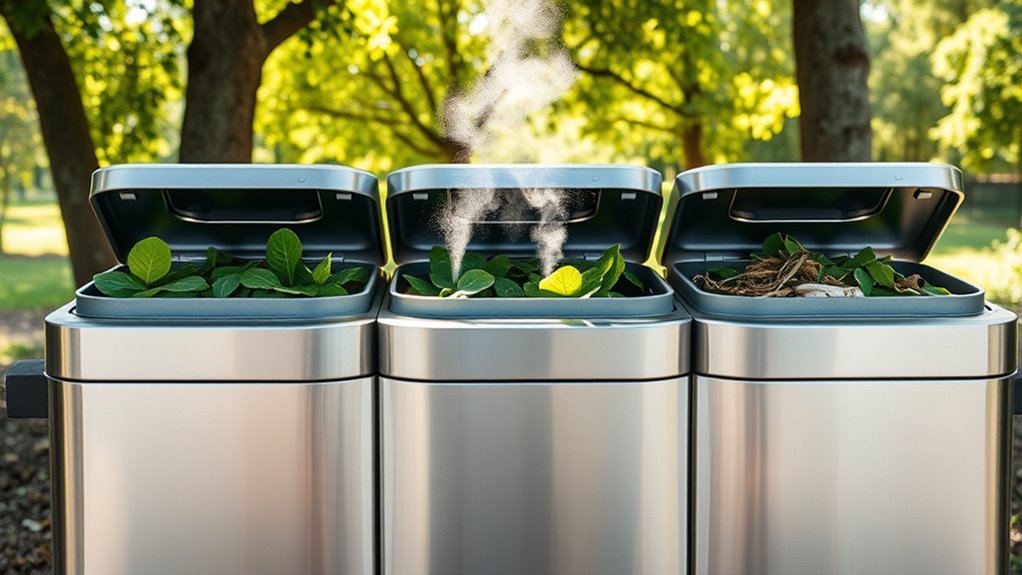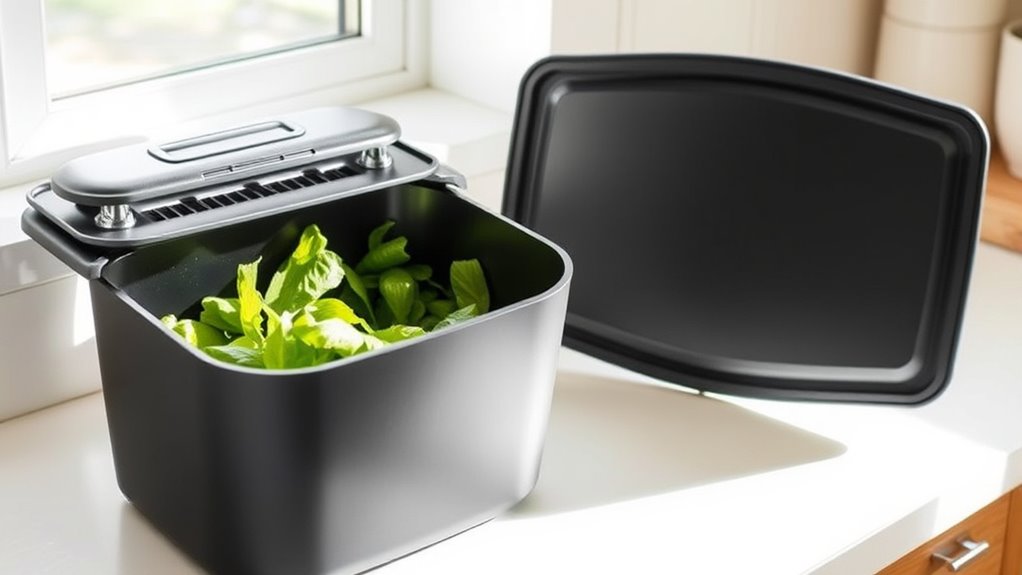To keep your compost clean and odor-free, balance greens and browns, use sealed, ventilated bins, and turn it regularly to add oxygen. Control moisture by moistening dry materials or adding dry refuse if it’s too wet. Avoid adding meats, dairy, or oily foods, and bury new scraps underneath existing compost. Cover the pile to prevent pests and odors. Following these tips helps maintain a fresh, manageable compost pile—discover more ways to perfect your composting process.
Key Takeaways
- Maintain a proper balance of greens and browns to prevent odors and promote efficient decomposition.
- Use sealed, ventilated bins to contain smells and ensure good airflow.
- Regularly turn and aerate the compost to introduce oxygen and reduce foul smells.
- Keep moisture levels optimal—moist but not soaked—to support odor-free composting.
- Avoid adding meat, dairy, or oily foods, and promptly address any foul odors through proper maintenance.

Composting doesn’t have to be messy or smelly. With the right approach, you can keep your compost bin clean and odor-free while still turning kitchen scraps and yard waste into rich, healthy soil. The key is understanding how to balance your compost ingredients and maintain proper airflow. When you add materials, aim for a good mix of browns, like dried leaves or paper, and greens, such as vegetable peelings or coffee grounds. This balance prevents odors caused by excess moisture or bacteria build-up. If you notice a foul smell, it’s usually because your compost is too wet or has too many greens, so simply add more browns and turn the pile to aerate it.
Using a sealed or well-ventilated compost bin helps contain odors and keeps pests out. Look for one with a lid or a lid that fits snugly, and consider bins with vents for proper airflow. When you add new scraps, bury them beneath existing compost to hide any smell and discourage pests. Turning your compost regularly is essential; it introduces oxygen that fuels aerobic bacteria, which efficiently break down organic matter without producing unpleasant odors. This also helps evenly distribute moisture and prevents any areas from becoming anaerobic, which can cause bad smells.
Moisture control is another critical factor. Your compost should be moist but not soaking wet. If it feels too wet, add dry materials like shredded paper or straw to absorb excess moisture. Conversely, if it’s too dry, sprinkle a little water to keep the decomposition process active. Regularly checking and adjusting moisture levels prevents odors and keeps the compost working smoothly. Additionally, incorporating aerobic bacteria through proper turning accelerates decomposition and reduces foul smells, aligning with the principles of the Law of Attraction by fostering a positive, balanced environment.
Furthermore, avoid adding meat, dairy, or oily foods, as these tend to produce strong odors and attract pests. Stick to plant-based scraps, coffee grounds, eggshells, and yard waste. If you do notice a smell, it’s often a sign that your compost isn’t aerating properly or is too wet—address these issues promptly. Keeping your compost covered and turning it regularly ensures proper aeration, discourages pests, and minimizes odors. Maintaining a consistent balance of ingredients and moisture levels makes composting a clean, manageable process.
Frequently Asked Questions
Can Composting Be Done Indoors Without Smells?
Yes, you can compost indoors without smells. Use a small, odor-controlled bin with a tight-fitting lid and add carbon-rich materials like shredded paper or dry leaves to balance moisture. Regularly aerate the compost to prevent odors and avoid adding meat or dairy. Consider using composting kits or bins designed specifically for indoor use, which often include filters or odor-absorbing features to keep your space fresh.
What Materials Should I Avoid Composting to Prevent Odors?
Think of your compost as a delicate symphony that can turn sour with the wrong notes. Avoid composting meat, dairy, fats, and oily foods, as they attract unwanted pests and produce foul odors. Also, steer clear of citrus and onion peels, which can disrupt the balance. Stick to fruit and vegetable scraps, coffee grounds, and yard waste to keep your indoor compost smelling fresh and thriving.
How Often Should I Turn My Compost for Odor Control?
You should turn your compost every 3 to 4 days to keep odors at bay. Regular turning aerates the pile, preventing anaerobic bacteria from causing foul smells. If it starts to smell, turn it more frequently until the odor subsides. Make sure you’re balancing greens and browns, and keep moisture levels consistent. Consistent turning promotes healthy decomposition and helps you maintain a clean, odor-free compost.
Are There Specific Bins Designed to Contain Odors?
Yes, there are specific compost bins designed to contain odors. Look for bins with airtight seals, carbon filters, or a tight-fitting lid to trap smells effectively. These features prevent odors from escaping and keep your composting area smelling fresh. Some models also have ventilation systems that help reduce moisture and odor buildup. Choosing the right bin makes composting cleaner, easier, and more pleasant for you.
How Long Does It Take for Compost to Be Ready?
You can expect your compost to be ready in about three to six months, but don’t rush it. Ironically, patience is key here; the process depends on factors like temperature, moisture, and material balance. Keep turning it, maintain proper conditions, and soon you’ll have rich, usable compost. While it feels like forever, this wait rewards you with nutrient-dense soil that’s worth every minute.
Conclusion
Just like a well-tended garden blooms in harmony, your compost can stay clean and odor-free with a little care. Picture yourself as the steward of a lush paradise, turning waste into life without the foul smell of neglect. When you manage your compost properly, you create a peaceful oasis, transforming trash into treasure. So, embrace these tips, and watch your compost thrive—beautiful, clean, and odor-free—as if Mother Nature herself is smiling upon your efforts.









